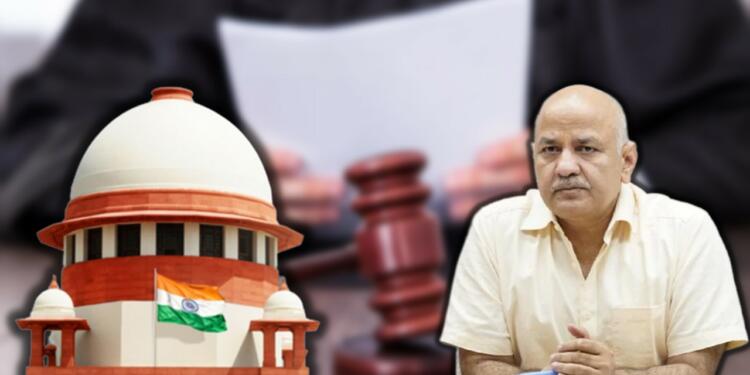Manish Sisodia fast track trial: Times are undeniably tough for Manish Sisodia, the once formidable figure in the Aam Aadmi Party (AAP) and the former Deputy Chief Minister of Delhi NCR. His recent journey through the corridors of justice has been anything but smooth. The Supreme Court, in a recent ruling, denied Manish Sisodia bail yet again, while also issuing a directive to expedite his trial on the fast track.
The two-judge bench, comprising Justices Sanjiv Khanna and SVN Bhatti, handed down this significant decision. In addition to denying bail, they stressed the importance of fast track the case, recognizing the possibility for Manish Sisodia to reapply for bail if the trial progresses at a slow pace.
Justice Khanna, speaking on behalf of the bench, clarified, “We have referred to the arguments and some of the legal questions but we have not answered most of them. In the analysis, there are certain aspects which are doubtful regarding the transfer of ₹338 crore. We have rejected the bail.”
#BREAKING #SupremeCourt denies bail to Manish Sisodia in Delhi liquor policy scam case. pic.twitter.com/OnywOQgur0
— Live Law (@LiveLawIndia) October 30, 2023
Also read: So finally, the main cause behind Delhi Pollution is out and it’s nothing you imagined
Manish Sisodia’s legal woes stem from serious charges of money laundering and corruption, all related to alleged irregularities in the formulation and execution of a now-defunct Delhi liquor policy. Sisodia has found himself in legal custody since February of this year, caught in the crosshairs of both the Central Bureau of Investigation (CBI) and the Enforcement Directorate (ED).
For those not well-versed in the details of this case, the Delhi liquor policy for 2021-22 went into effect under the purview of the Delhi administration on 17th November 2021. However, by the end of September 2022, it had been scrapped due to a cloud of corruption allegations that hovered over it.
The investigating authorities assert that under this new policy, financial considerations took precedence over fairness. According to these agencies, the revised regulation inadvertently led to monopolization, providing economic advantages to individuals who weren’t eligible for liquor licenses.
The charges against Sisodia encompass money laundering and corruption, arising from his alleged involvement in irregularities associated with the Delhi liquor policy. This policy, while initially implemented with the aim of regulating the sale and distribution of liquor, soon became mired in controversy.
The Delhi administration rolled out the liquor policy for 2021-22 in November 2021. However, by September 2022, it had been unceremoniously shelved due to mounting accusations of corruption. Central to these allegations was the claim that the policy, in an attempt to address financial concerns, inadvertently led to monopolization within the liquor industry.
The core issue at the heart of the controversy surrounding the Delhi liquor policy appears to be the unintended consequences of the regulatory changes. These consequences reportedly favored a select few, granting them economic advantages they were not entitled to. Such allegations cast a shadow over the policy’s intentions, giving rise to a legal quagmire that Manish Sisodia now finds himself embroiled in.
Also read:Mahua Moitra is only digging her political grave deeper!
Manish Sisodia’s legal battles and the Supreme Court’s recent decision to deny him bail serve as a stark reminder of the intricate and often tumultuous world of Indian politics and the legal challenges it can present. Sisodia’s prominence in the AAP, his tenure as Deputy Chief Minister of Delhi NCR, and his subsequent legal troubles exemplify the high stakes and complexities involved in the realm of governance.
The court’s direction to expedite the trial underscores the urgency to address the accusations and reach a resolution in this case. The denial of bail is a decision that carries significant weight, signaling the gravity of the charges against Sisodia.
As this case unfolds, it will undoubtedly continue to captivate the attention of the public and the political landscape. It also serves as a reminder of the need for transparency, accountability, and adherence to the rule of law in India’s political and administrative spheres. Only time will tell how this legal drama will ultimately unfold and what implications it may hold for both the accused and the political landscape in the country.
Support TFI:
Support us to strengthen the ‘Right’ ideology of cultural nationalism by purchasing the best quality garments from TFI-STORE.COM.






















